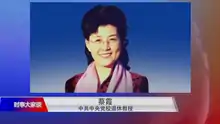Cai Xia
Cai Xia (Chinese: 蔡霞; pinyin: Cài Xiá, born October 1952)[1] is a Chinese dissident and scholar of political theory. She has taught high-ranking members and officials of the Chinese Communist Party (CCP), including leading provincial and municipal administrators and cabinet-level ministers, and is a retired professor of the CCP Central Party School.[2] She is an advocate for political liberalisation in China and has been critical of CCP General Secretary Xi Jinping. She was expelled from the CCP in August 2020 for criticising the CCP under Xi's rule. She has resided in the U.S. since 2019.[3][4][5]

Career
Cai Xia was born in October 1952 in Changzhou, Jiangsu province[6] and was raised in a family with close ties to the military, in which she later served herself before joining the CCP in 1982.[4] In 1978 she participated in a two-year program in Marxist theory and CCP history at the Suzhou Municipal Party School.[2] Eventually she turned to work in academia, earning a doctorate in law at the Central Party School in 1988.[7] Specializing in the fields of party ideology and party building of the party state (with "party" referring to the CCP), she published over 60 scholarly papers between 1989 and 2020.[8] As of 2012, she was a professor at the Party-building Center of the Central Party School,[9] retiring the same year after 15 years of service.[10]
According to an August 2020 article in The Guardian, Cai began doubting the party orthodoxy in the early 2000s, when she assisted then-CCP general secretary Jiang Zemin with the drafting of his Three Represents theory.[4] By that time she was frequently present in Chinese news media, advocating for liberal views including the opening of the CCP to more businesspeople and professionals.[10] Her faith in the Communist Party was shaken considerably after a trip to Spain where she studied the Spanish transition to democracy and comparing it to China, noting that Mao and Franco had died at similar times yet Franco's successors had quickly and successfully transitioned to a stable democracy while Mao's successors had created a muddled hybrid economy and completely ignored political reform.[2] For some years she continued to believe in the ability of the CCP to solve its problems through reform, but her hopes gradually evaporated after Xi Jinping came to power in 2012 and implemented measures that Cai saw as going in the wrong direction.[4] In 2013, she wrote an essay defending Charles Xue (Xue Manzi) after Xue was arrested on charges of soliciting a prostitute. In the piece, which widely circulated on the microblogging site Weibo, Cai opined that the offence was a private matter of no consequence to the public, and called for a discussion of protection of individual rights.[11] In 2016, she wrote an article in defence of Ren Zhiqiang, who was put on probation after the latter's heavy criticism of the statements by CCP leader Xi Jinping about the role of Chinese media. These and other essays were later removed by internet censors.[4] In an August 2020 interview, after her move to the United States, Cai said that the incident that had erased all her remaining faith in the party was the Chinese authorities' handling of the death of environmentalist Lei Yang in police custody.[10] In an essay dated 25 July 2020, published by Radio Free Asia, she denounced the treatment of Xu Zhangrun, who had been detained earlier that month, as "openly intimidating all in the Chinese scholarly community".[10]
Expulsion from the CCP
On 17 August 2020, Cai's membership in the CCP was rescinded and her retirement benefits were stripped. This was presumed to be in relation to audio recordings in which she called CCP general secretary Xi Jinping a "mafia boss" who ought to be replaced, and in which she described the CCP as a "political zombie".[12] Cai, who was residing in the United States at the time of the expulsion, told The New York Times that she had contemplated resigning from the CCP since much earlier, and welcomed no longer being a CCP member, saying that it had allowed her to regain freedom.[1][10]
On 23 August 2020, in an interview with CNN, Cai Xia expressed support for the U.S. government's ban on Huawei and proposed that the U.S. government impose sanctions on CCP officials, while asking the international community to prevent the CCP from infiltrating international organizations.[13]
See also
References
- 称中共"政治僵尸" 蔡霞被中央党校开除党籍 | DW | 17 August 2020. Deutsche Welle (in Chinese). Retrieved 25 August 2020.
- Cai, Xia (December 4, 2020). "The Party That Failed: An Insider Breaks With Beijing". Foreign Affairs. Archived from the original on December 6, 2020.
- Staff, C. N. N. (23 August 2020). "China's Communist Party is a threat to the world, says former elite insider". CNN. Retrieved 24 August 2020.
- Kuo, Lily (21 August 2020). "China's Cai Xia: former party insider who dared criticise Xi Jinping". The Guardian. Retrieved 24 August 2020.
- "Explained: Who is Cai Xia, the Chinese dissident who called Xi Jinping a 'mafia boss'". The Indian Express. 24 August 2020. Retrieved 24 August 2020.
- "蔡霞". 《探索与争鸣》. Archived from the original on 18 August 2020. Retrieved 24 September 2020.
- "Cai Xia, "Advancing Constitutional Democracy". Translated by Timothy Cheek, Joshua A. Fogel, and David Ownby". Reading the China Dream. n.d. Archived from the original on 2020-02-12.
- "蔡霞". 爱思想网. Archived from the original on 27 February 2020.
- Tatlow, Didi Kirsten (11 July 2012). "No Women at the Top in China". nytimes.com. Retrieved 26 September 2020.
- Buckley, Chris (20 August 2020). "She Was a Communist Party Insider in China. Then She Denounced Xi". The New York Times. Retrieved 26 September 2020.
- Quan, Isabel (29 August 2013). "The Terrible Lives of Chinese Sex Workers". The Atlantic. Retrieved 24 September 2020.
- Yew, Lun Tian (17 August 2020). "Chinese academic disciplined after criticising Xi and Communist Party". Reuters.com. Retrieved 24 September 2020.
- "蔡霞:习近平不下台 中共体制将全面瓦解". Deutsche Welle. Archived from the original on 25 August 2020. Retrieved 24 August 2020.